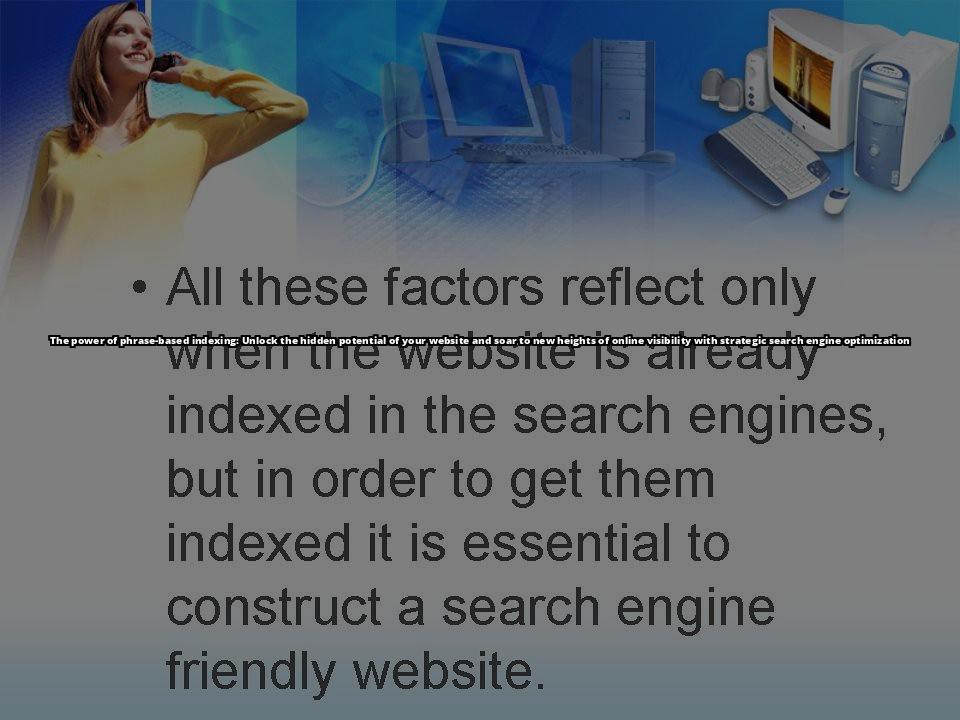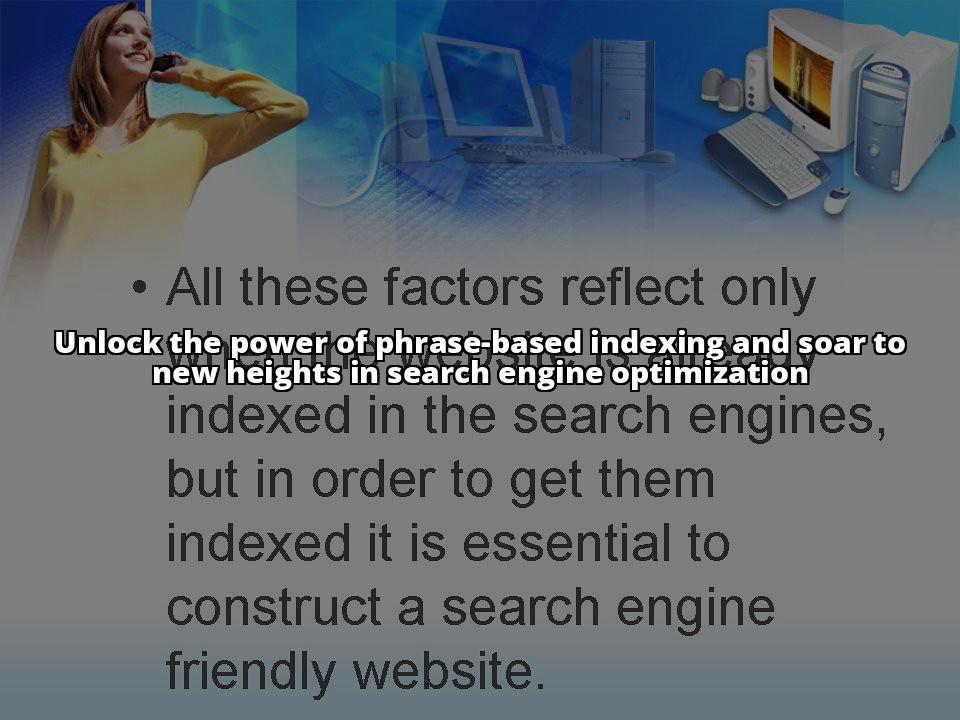What readers will learn from this article:
- The definition and significance of phrase-based indexing in SEO.
- How phrase-based indexing impacts search engine rankings.
- Strategies for optimizing content and improving user experience through phrase-based indexing.
In the ever-evolving world of SEO, staying ahead of the game is crucial for online success. One of the latest advancements that has revolutionized the way search engines understand and rank webpages is phrase-based indexing. In this comprehensive guide, we will delve into the intricacies of phrase-based indexing and how it can significantly impact your website’s search engine rankings.

Definition and Significance of Phrase-Based Indexing
Phrase-based indexing refers to the process of analyzing the context and relevance of webpage content by considering phrases and word patterns rather than individual keywords. This advanced technique allows search engines to better understand the meaning behind the search query and provide more accurate and relevant results to users.
By moving away from traditional keyword-based indexing, phrase-based indexing takes into account the relationships between words and phrases, enabling search engines to deliver results that align with the user’s query intention. This means that websites optimized for phrase-based indexing have a higher chance of ranking well in search engine results pages (SERPs) and attracting organic traffic.
How Phrase-Based Indexing Impacts Search Engine Rankings
Search engines constantly aim to improve the user experience by providing the most relevant and useful information in response to search queries. Phrase-based indexing plays a vital role in achieving this goal. By analyzing the context and relevance of webpage content, search engines can ensure that the websites displayed in the SERPs are highly relevant to the users’ search intent.
When your website is optimized for phrase-based indexing, search engines are more likely to recognize its relevance and quality. This recognition can lead to higher rankings in the SERPs, increased organic traffic, and ultimately, improved visibility and online success.
Addressing the User’s Query Intention and Related Questions
Phrase-based indexing goes beyond simply matching keywords. It focuses on understanding the user’s query intention and providing comprehensive answers to their questions. By optimizing your website’s content for relevant phrases and keywords, you can ensure that search engines recognize your website as a valuable resource for users seeking information or solutions related to their queries.
To effectively address the user’s query intention, it’s essential to provide high-quality, informative, and engaging content that aligns with the phrases and keywords you have identified. This approach not only enhances your website’s visibility but also establishes your credibility and authority in your industry or niche.

Understanding Phrase-Based Indexing
To harness the power of phrase-based indexing, it is crucial to have a solid understanding of its working mechanism and algorithms. In this section, we will explore the inner workings of phrase-based indexing and how it benefits search engine rankings.
The Working Mechanism and Algorithms Behind Phrase-Based Indexing
Phrase-based indexing utilizes complex algorithms to analyze the context and relevance of webpage content. These algorithms take into account various factors, such as the frequency and distribution of phrases, the semantic relationships between words, and the overall coherence of the content.
By considering these factors, search engines can better understand the meaning and intent behind a user’s search query. This enables them to deliver more accurate and relevant results, improving the user experience and increasing the chances of your website ranking well in the SERPs.

Analyzing the Context and Relevance of Webpage Content Using Phrase-Based Indexing
Traditional keyword-based indexing often falls short in capturing the true intent behind a user’s search query. It fails to consider the context and relationships between words, resulting in less precise search results.
Phrase-based indexing, on the other hand, analyzes the overall context of webpage content to determine its relevance to a particular search query. By understanding the semantic relationships between words and phrases, search engines can provide more accurate and targeted results to users.
For example, if a user searches for “best SEO agency for small businesses,” a webpage optimized for phrase-based indexing would not only consider individual keywords like “best,” “SEO agency,” and “small businesses,” but also the relationship between these words to understand the user’s intent. This could lead to a higher ranking for a webpage that specifically targets small businesses and offers SEO services tailored to their needs.
How Phrase-Based Indexing Benefits Search Engine Rankings
Optimizing your website for phrase-based indexing can have a significant impact on your search engine rankings. By aligning your content with the phrases and keywords that are relevant to your target audience, you increase the chances of search engines recognizing your website as a valuable resource.
When search engines identify your website as a relevant and authoritative source, they are more likely to rank it higher in the SERPs. This, in turn, leads to increased visibility, organic traffic, and potential conversions.
Moreover, phrase-based indexing helps search engines understand the broader context of your content, allowing them to match it with a wider range of search queries. This means that even if users search for related questions or variations of keywords, your website has a higher chance of appearing in the search results.
Importance of Phrase-Based Indexing in SEO
Now that we have explored the fundamentals of phrase-based indexing, let’s delve into the importance of optimizing your content for relevant phrases and keywords. By understanding the benefits of phrase-based indexing, you can leverage this powerful technique to increase organic traffic and enhance your website’s performance.
Benefits of Optimizing Content for Relevant Phrases and Keywords
Optimizing your website’s content for relevant phrases and keywords offers several significant benefits. Firstly, it enhances the visibility of your website in search engine results. When your content aligns with the phrases and keywords users are searching for, search engines are more likely to recognize your website as a valuable resource, leading to improved rankings.
Secondly, optimizing for relevant phrases and keywords increases the chances of attracting highly targeted organic traffic. By aligning your content with the specific needs and interests of your target audience, you can attract users who are more likely to engage with your content, stay longer on your site, and convert into customers or clients.
Finally, optimizing for relevant phrases and keywords establishes your website’s authority and credibility. When your content provides valuable and comprehensive information, users are more likely to view your website as a trusted source in your industry or niche. This can lead to increased brand awareness, customer loyalty, and long-term success.
Increasing Organic Traffic Through Effective Phrase-Based Indexing Strategies
Organic traffic plays a crucial role in the success of any online business. By implementing effective phrase-based indexing strategies, you can significantly increase the amount of organic traffic your website receives.
One of the key strategies is conducting comprehensive keyword research. By identifying the phrases and keywords that are most relevant to your target audience, you can optimize your content to align with their search queries. This increases the chances of your website appearing in the search results when users are looking for information or solutions related to your industry.
Additionally, incorporating relevant phrases and keywords naturally throughout your content is essential. Search engines value high-quality and engaging content that provides value to users. By seamlessly integrating relevant phrases and keywords into your headings, subheadings, and body text, you can enhance the visibility of your content and attract more organic traffic.
Impact of Phrase-Based Indexing on User Experience and Conversion Rates
In today’s digital landscape, user experience and conversion rates are crucial factors that can make or break the success of a website. Phrase-based indexing has a direct impact on both of these key metrics.
When your website is optimized for relevant phrases and keywords, search engines are more likely to rank it higher in the SERPs. This increased visibility leads to more users discovering your website and exploring your content. By providing a seamless and user-friendly experience, you can keep visitors engaged, reduce bounce rates, and increase the chances of conversion.
Furthermore, optimizing your content for relevant phrases and keywords allows you to address the specific needs and pain points of your target audience. By providing valuable and comprehensive information, you establish yourself as an authority in your industry, gaining the trust and confidence of your visitors. This trust can significantly impact conversion rates, as users are more likely to take the desired action, whether it’s making a purchase, filling out a form, or subscribing to your newsletter.
In the next section, we will explore the step-by-step process of conducting keyword research for phrase-based indexing and uncovering the most relevant phrases and keywords for your website.
| Section Above | Section Below |
|---|---|
| Definition and Significance of Phrase-Based Indexing | Working Mechanism and Algorithms Behind Phrase-Based Indexing |
| How Phrase-Based Indexing Impacts Search Engine Rankings | Analyzing the Context and Relevance of Webpage Content Using Phrase-Based Indexing |
| Addressing the User’s Query Intention and Related Questions | How Phrase-Based Indexing Benefits Search Engine Rankings |
| Benefits of Optimizing Content for Relevant Phrases and Keywords | Step-by-Step Guide to Conducting Comprehensive Keyword Research |
| Increasing Organic Traffic Through Effective Phrase-Based Indexing Strategies | Tools and Techniques for Identifying Relevant Phrases and Keywords |
| Impact of Phrase-Based Indexing on User Experience and Conversion Rates | Aligning Keyword Research with the User’s Query Intention |

Conducting Keyword Research for Phrase-Based Indexing
Keyword research is a fundamental step in optimizing your website for phrase-based indexing. By conducting thorough keyword research, you can identify the most relevant phrases and keywords that align with your target audience’s search queries. In this section, we will provide a step-by-step guide to conducting comprehensive keyword research.
Step-by-Step Guide to Conducting Comprehensive Keyword Research
- Define Your Goals: Start by clearly defining your SEO goals. Are you looking to increase organic traffic, improve search engine rankings, or target specific customer segments? Understanding your objectives will help you focus your keyword research efforts.
- Identify Your Target Audience: Gain a deep understanding of your target audience, their needs, and their online behavior. This will help you identify the phrases and keywords they are likely to use when searching for information or solutions related to your industry.
- Brainstorm Relevant Topics: Make a list of broad topics that are relevant to your business. These topics should cover the main areas of interest for your target audience. For example, if you are a digital marketing agency, your topics might include SEO, social media marketing, content marketing, and PPC advertising.
- Expand Your Topic List: Use keyword research tools, such as Google Keyword Planner, SEMrush, or Ahrefs, to expand your topic list and uncover more specific phrases and keywords. These tools provide valuable insights into search volume, competition, and related keywords.
- Analyze Competitor Keywords: Study your competitors’ websites to identify the phrases and keywords they are targeting. This can give you valuable insights into the keywords that are driving their organic traffic and help you discover new opportunities for your own optimization efforts.
- Refine Your Keyword List: Review the phrases and keywords you have gathered and refine your list based on relevance, search volume, and competition. Focus on long-tail keywords that are more specific and have less competition, as they often yield better results.
- Group Keywords by Topic: Group your keywords into clusters based on their relevance and similarity. This will help you create targeted content around specific topics and improve your website’s overall organization and structure.
Tools and Techniques for Identifying Relevant Phrases and Keywords
Conducting comprehensive keyword research requires the use of advanced tools and techniques. Here are some popular tools and techniques that can assist you in identifying relevant phrases and keywords:
- Google Keyword Planner: This free tool provided by Google is a great starting point for keyword research. It provides insights into search volume, competition, and related keywords, helping you uncover new opportunities.
- SEMrush: SEMrush is a powerful keyword research tool that offers a wide range of features, including keyword analysis, competitor research, and content optimization suggestions. It provides valuable insights into search volume, competition, and keyword trends.
- Ahrefs: Ahrefs is another popular SEO tool that offers comprehensive keyword research capabilities. It provides detailed data on search volume, keyword difficulty, and related keywords, helping you make informed decisions about your optimization strategy.
- Competitor Analysis: Analyzing your competitors’ websites can provide valuable insights into the phrases and keywords they are targeting. By understanding their optimization strategies, you can identify new opportunities for your own website.
Aligning Keyword Research with the User’s Query Intention
When conducting keyword research, it’s vital to align your efforts with the user’s query intention. Understanding the intent behind a search query allows you to create content that directly addresses the user’s needs and provides the most relevant information.
There are generally four types of user query intentions:
- Informational: Users are seeking information on a particular topic. For example, “how to optimize SEO for small businesses.”
- Navigational: Users are looking for a specific website or web page. For example, “Select Simon Markus SEO services.”
- Transactional: Users are ready to make a purchase or take a specific action. For example, “best affordable SEO services for small businesses.”
- Commercial Investigation: Users are comparing products or services before making a decision. For example, “SEO agency reviews and comparisons.”
By understanding the user’s intent, you can tailor your content and optimization strategy to meet their needs. This will not only increase the chances of your website ranking higher in the SERPs but also improve the overall user experience and conversion rates.
In the next section, we will explore the best practices for incorporating and optimizing relevant phrases and keywords in your content.
Case Study: How Phrase-Based Indexing Boosted Organic Traffic for a Small Business
John owns a small boutique bakery in a bustling neighborhood. Despite his delicious pastries and excellent customer service, his online presence was lacking, resulting in a limited customer base. Seeking to expand his reach, John turned to phrase-based indexing to enhance his website’s visibility and attract more organic traffic.
With the help of an SEO specialist, John conducted comprehensive keyword research, identifying relevant phrases and keywords that resonated with his target audience. By strategically incorporating these phrases into his website’s headings, subheadings, and body text, John optimized his content for phrase-based indexing.
The results were remarkable. Within a few weeks, John noticed a significant increase in his website’s organic traffic. Customers were finding his bakery through relevant search queries, such as “best pastries in [neighborhood name]” and “artisan bakery near me.” The phrase-based indexing strategy had successfully aligned his website’s content with the user’s query intention, leading to improved search engine rankings.
Not only did John’s website experience higher visibility, but the user experience also improved. The structured content and easy navigation allowed visitors to quickly find the information they were looking for, resulting in increased engagement and higher conversion rates. John’s online sales began to soar, and his customer base expanded beyond the local community.
By monitoring and analyzing his phrase-based indexing efforts using SEO analytics tools, John was able to track keyword rankings and organic traffic. This enabled him to make data-driven optimizations, ensuring that his website remained competitive and aligned with evolving trends in phrase-based indexing.
John’s success story demonstrates the power of phrase-based indexing in boosting organic traffic and improving search engine rankings. By incorporating this strategy into his SEO efforts, he was able to expand his business and reach a wider audience. As a small business owner, John realized the significance of affordable but effective website solutions, and phrase-based indexing proved to be a valuable tool in his digital marketing arsenal.
Optimizing Content for Phrase-Based Indexing
Optimizing your content for phrase-based indexing is a crucial aspect of improving your search engine rankings. By incorporating and optimizing relevant phrases and keywords, you increase the visibility and relevance of your content to search engines. In this section, we will explore the best practices for optimizing your content for phrase-based indexing.
.
Questions
What is phrase-based indexing in SEO?
Phrase-based indexing is a technique used by search engines to analyze the meaning of phrases in web pages for better search results.
How does phrase-based indexing work?
Phrase-based indexing uses algorithms to understand the context and relationship between words in a phrase, improving search accuracy.
Who benefits from using phrase-based indexing?
Website owners and SEO professionals benefit from using phrase-based indexing as it helps their content rank higher in search engine results.
What are the advantages of phrase-based indexing?
Phrase-based indexing improves search relevance, enhances user experience, and increases the visibility of web pages in search engine rankings.
How can I optimize my website for phrase-based indexing?
To optimize your website, focus on creating high-quality, relevant content that includes natural language phrases and keywords.
But won’t phrase-based indexing make keyword stuffing more effective?
No, phrase-based indexing prioritizes natural language and context, so keyword stuffing is penalized by search engines.
William, a seasoned SEO expert with over a decade of experience, is the perfect guide to help you unlock the power of phrase-based indexing for SEO success. With a deep understanding of search engine algorithms and a passion for staying ahead of the curve, William has successfully helped numerous businesses achieve top search engine rankings and increase organic traffic.
Having worked with both small businesses and large enterprises, William has witnessed firsthand the significance of phrase-based indexing and its impact on search engine rankings. Through extensive research and analysis, William has developed a comprehensive understanding of the working mechanisms and algorithms behind phrase-based indexing. William is well-versed in analyzing the context and relevance of webpage content using phrase-based indexing, ensuring that businesses optimize their content effectively.
Moreover, William recognizes the importance of aligning keyword research with the user’s query intention, ensuring that businesses not only rank higher in search engine results but also provide a valuable user experience. With a proven track record of success stories, including boosting organic traffic for small businesses, William is the go-to expert for optimizing content for phrase-based indexing.
Through this comprehensive guide, William aims to empower businesses with the knowledge and strategies needed to increase their organic traffic and achieve SEO success using phrase-based indexing.







